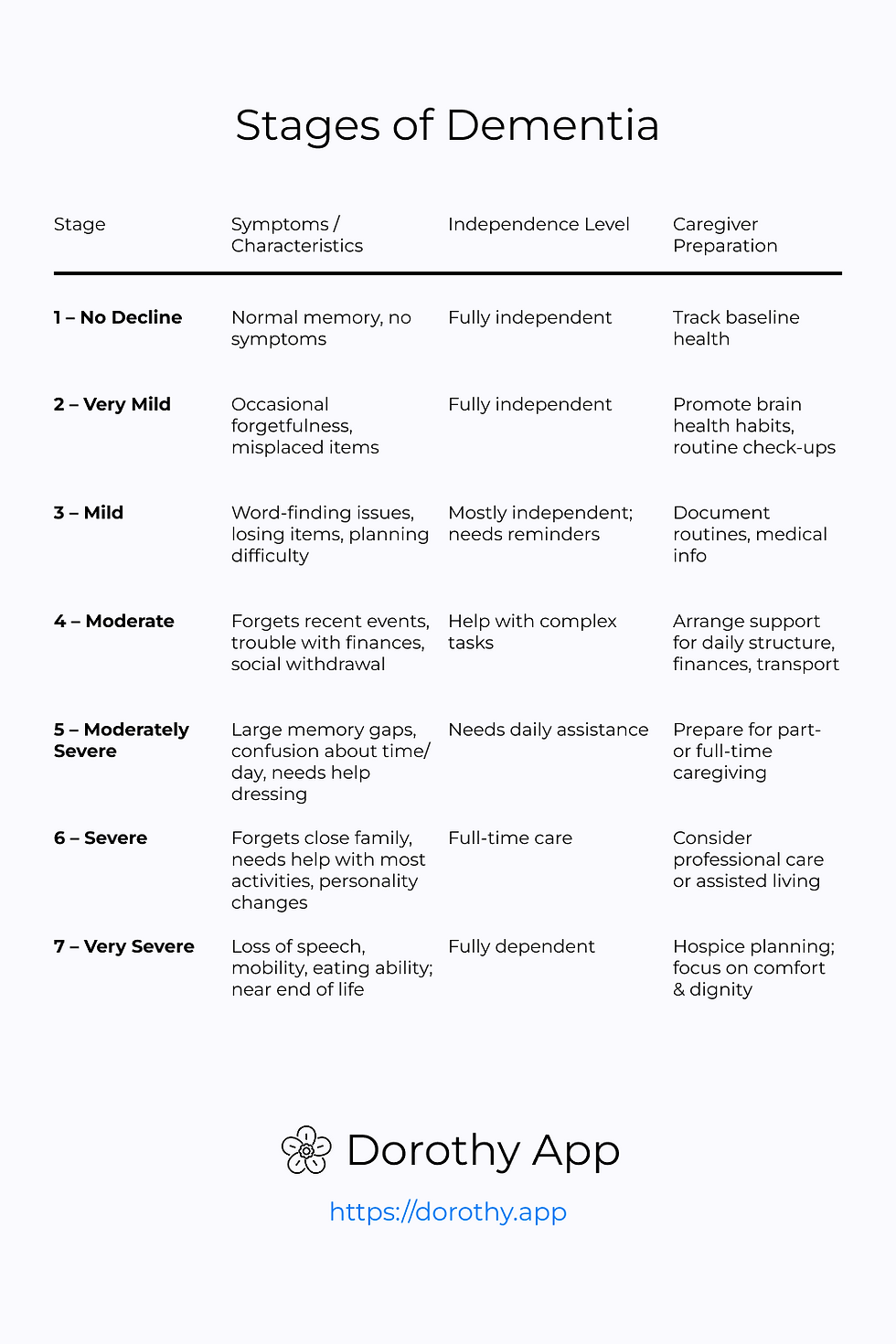Stages of Dementia Chart: What to Expect and How to Prepare
- Ilya Rybin
- 4 days ago
- 2 min read
When you first hear a dementia diagnosis for your loved one, the uncertainty about what comes next can be overwhelming. Understanding the stages of dementia can help you prepare emotionally, practically, and financially for the journey ahead.
In this article, we’ll walk you through the 7 stages of dementia, explain what symptoms are common in each, and offer guidance on how much help your loved one might need. Whether you’re caring for an elderly parent with Alzheimer’s, vascular dementia, or another type, this stages of dementia chart can be your roadmap.
Why Knowing the Stages Matters
It helps you plan ahead for medical, emotional, and financial needs.
It allows you to adjust caregiving approaches at the right time.
It reduces stress by helping you anticipate changes before they happen.
The 7 Stages of Dementia Chart
The 7 stages of dementia were first outlined by Dr. Barry Reisberg and are widely used to understand the disease’s progression.

Stage-by-Stage Guidance for Caregivers
Stage 1–2: Early Awareness
At this point, your loved one is living life normally. Focus on healthy routines—nutrition, exercise, mental stimulation. Start keeping gentle notes on any changes in memory or mood.
Stage 3: The First Noticeable Signs
This is when friends or family might first suspect something is wrong. Your role:
Keep track of patterns using a caregiver tracking tool like the Dorothy Caregiver App.
Encourage social activities and mental engagement.
Stage 4: Planning Stage
This is a turning point. You’ll need to:
Take over complex tasks like bill paying and appointment scheduling.
Create a safety plan for driving, wandering, and medication management.
Begin researching in-home care costs (see our guide: Cost of In-Home Care for Elderly).
Stage 5–6: Hands-On Care
Daily assistance becomes essential. Caregivers should:
Learn safe transfer and bathing techniques.
Consider respite care to avoid burnout.
Explore legal preparations (power of attorney, medical directives).
Stage 7: End-of-Life Care
At this stage, the focus is on comfort:
Hospice care or skilled nursing may be necessary.
Emotional support for both the patient and family is critical.
Document and share your loved one’s preferences for dignity and peace.
Final Thoughts
Dementia is a progressive journey, but understanding the stages of dementia chart gives you the ability to prepare—practically and emotionally—for what lies ahead. You are not alone in this journey, and the right knowledge and tools can make all the difference.
Simplify Caregiving with Dorothy Caregiver App
Consistency is key for positive caregiving outcomes. Maintaining it might feel overwhelming, but it doesn't have to be. Dorothy Caregiver is a specialized app designed by mental health professionals and software experts to support dementia caregivers in their daily routine.
With Dorothy Caregiver, you can:
Easily track wellbeing habits like hydration, nutrition, sleep, and mood.
Get daily reminders to log your loved one's day
Get practical caregiving tips whenever challenging situations arise.
Links
Alzheimer’s Association – Stages of Alzheimer’s
National Institute on Aging – Alzheimer’s Disease Fact Sheet
Dementia Australia – Progression of Dementia
Alzheimer’s Society UK – About the progression of dementia
Family Caregiver Alliance – Stages of Dementia
.png)


